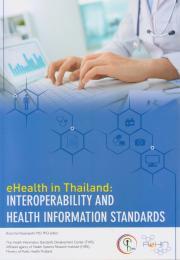
Title: eHealth in Thailand: Interoperability and Health Information Standards
Authors: Boonchai Kijsanayotin et al
Issue Date: June-2016
Publisher: Thai Health Information Standards Development Center, Health System Research Institute
Abstract:
Interoperability of different health information systems is one of the major challenges for countries to develop functional, integrated and effective health information systems. It is evident that the lack of uniform data standards will lead to information fragmentation. Interoperability of information systems needs the whole stack of standards which include content, syntactic, semantic and security standards.
This report provided fundamental knowledge of health information standards and interoperability and also explored and reviewed the development, adoption and use of health data standards in Thailand. Thailand has developed, adopted and implemented some health data standards such as the citizen ID system, the health provider facility ID system, standard data sets for reporting and insurance reimbursement systems, and the International Classification of Diseases (ICD). However, the current standards are not adequate. To support information exchange of administrative and clinical data, and Electronic Health Record (EHR), Thailand needs more health data standards. The demands of containing healthcare cost by the government led to the development of health data standards that can identify healthcare resources and analyze their utilization. Thai Health Information Standard Development Center (THIS), responds to the demands by researching and developing two semantic standards, the Thai Medicines Terminology (TMT) and Logical Observation Identifiers Names and Codes (LOINC). The development of TMT and the adoption of LOINC aim to facilitate the EHR interoperability in Thailand. The standards that can support both administrative functions and also health information exchange for clinical and quality of care. TMT is currently implemented in Thai insurance reimbursement information systems and the government e-procurement information system. LOINC, a widely use international standard, has been studied for the plausibility of adopting the standard in Thai healthcare service context. The study shows that LOINC can be used and should be adopted in Thailand.
Though health informatics professionals in Thailand have encouraged the adoption of health data standards, there are barriers such as a lack of human resources in health informatics, lack of awareness and unfamiliarity with the potential benefits of using standards and terminologies in healthcare among high level policy makers and healthcare professionals. With these barriers in mind, we recommend the following steps for the development of health information standards in Thailand:
• Governance and leadership of national eHealth systems are essential and critical for the country to achieve interoperability through health data standards.
• Incentives and mandates from the governing body that has authority are important to the adoption of standards.
• Standards maintenance process is a necessary component of successful implementation of every standard.
• Advocacy on the potential benefits from using data standards as well as communication between the organizations and the users are of importance.
• Human resource in health informatics is an important component and building capacity for them is essential.
Download: he0140.zip




